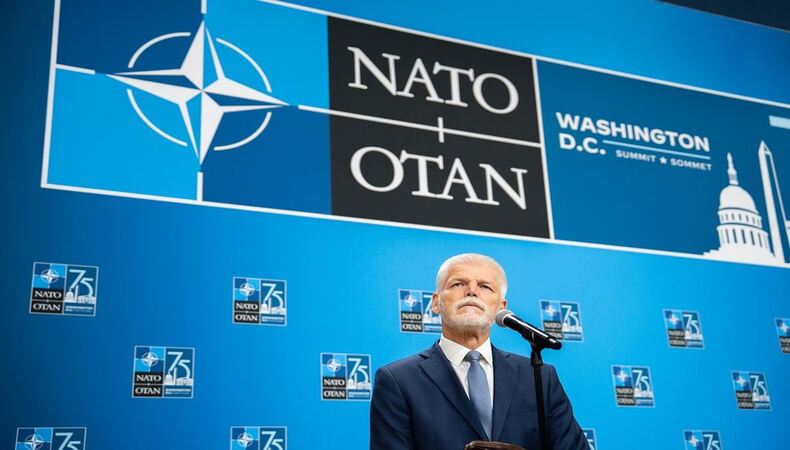Czech President Petr Pavel on the Ukraine-Russia War: A Realization of Futility and the Path to Negotiation

Former NATO Military Committee Chairman Petr Pavel, the Czech President, has offered his observations on the extended conflict between Ukraine and Russia, implying that only when both countries come to a mutual understanding whereby continuing the war is no longer feasible will a solution be conceivable. Emphasizing the need of both parties realizing the limits of employing armed force to achieve their political objectives, Pavel described the circumstances under which the conflict can finally put to a stop in an open interview with Noventy.
The Unknown Chronology of War: Projected Duration
Journalists asked President Pavel on the possible length of the conflict, and he gave a reasonable, albeit depressing response. The war, he said, is probably going to last “until there is enough strength to convince both sides that military tools cannot achieve their political goals.” Pavel said that depending on certain ground-based circumstances, this moment of awareness may happen as early as this year or could be postponed by several years. He also did not rule out the prospect that the fight would turn into a frozen stalemate, in which case active combat fades but tensions remain strong and might endure for decades.
Global Powers and Their Significance in Peace: The Demand of International Intervention
Resolving the Ukraine-Russia conflict will necessitate major intervention from global powers, including the United States and China, President Pavel underlined, stressing that it will not only call for regional or bilateral initiatives. These countries should use their great political, financial, and diplomatic clout, he said, to steer Russia and Ukraine toward a negotiated agreement. Pavel noted that although the European Union is a big political and economic actor that is indispensible, it cannot do this on its own. Rather, pushing the opposing parties toward genuine communication depends on a united and coordinated posture along with the USA and other democratic nations.
The Difficulties of Diplomacy: Traveling a Road to Peace
Pavel’s comments draw attention to the natural challenges in turning the fight from military to diplomatic phase. Given the strongly ingrained beliefs and patriotic attitudes on both sides, he underlined that bringing both Ukraine and Russia to the negotiating table presents many difficulties. For Russia, the conflict relates to President Vladimir Putin’s more general aspirations to restore Russian authority over former Soviet territory. Defining its sovereignty and territorial integrity, the battle for Ukraine is about rallying around a strong sense of resistance against what the country believes to be Russian aggression.
Ukraine’s Peace Formula: Negotiating a Framework
Ukraine, for its part, has been explicit about the terms under which the war should be stopped. The government of Ukraine insists on a peace accord honoring its sovereignty and territory integrity. In order to this purpose, Ukrainian officials have created a thorough ten-point peace formula they want to provide Russia as a foundation for negotiations. This formula lists Ukraine’s main needs, including security assurances to stop future aggression, reparations for war damage, and the departure of Russian soldiers from seized territory.
Along with reflecting Ukraine’s current war objectives, this peace proposal also captures its long-term vision for guaranteeing security and peace in the area. The success of this strategy, however, depends on Russia’s readiness to negotiate under these terms—which, given current hostilities and Russia’s ongoing military activities in Ukraine seem doubtful.
The Conflict’s Future: Realizing and Negotiating the Path to Peace
The remarks of President Pavel highlight the complexity and ambiguity behind the conflict between Russia and Ukraine. He speculates that the battle might last until both sides realize that more military escalation is useless. This insight could act as the impetus for a change from war to diplomacy, therefore clearing the path for negotiations that would at last stop the bloodshed.
Pavel’s appeal for the participation of world powers emphasizes the necessity of a larger worldwide endeavor toward peace. With their great influence, countries like the USA and China might be very important in establishing the environment required for effective negotiations. Without such participation, the possibility of the conflict going on endlessly stays great.
European and World Stakes: More General Consequences of the Ukraine-Russia War
Apart from the two countries engaged, the continuous conflict between Ukraine and Russia has broad consequences for Europe and the globe at general level. Millions of Ukrainians have been forced from their homes and important infrastructure has been destroyed all around the nation, therefore sparking a major humanitarian crisis already. Globally, the war has had an economic impact shown in disruptions to oil supply, growing prices, and more geopolitical instability.
Reminiscent of the tensions during the Cold fighting, the fighting has rekindled worries of a more general battle for Europe. Managing the economic consequences of the crisis, the European Union has been obliged to strike a careful balance between helping Ukraine and avoiding direct confrontation with Russia.
Final Thought: Directions Ahead
The road toward peace is elusive as the conflict between Ukraine and Russia grinds on. Emphasizing the need of both sides realizing the constraints of military solutions and the need of international participation in facilitating negotiations, President Pavel’s observations offer a vital viewpoint on the possible directions forward. Watching with bated breath, the world hopes for a solution that would provide stability and peace to a nation having so much pain. Whether this dispute will finally veer toward a peaceful ending or remain a lengthy shadow over Europe and the globe will depend much on the next months and years.
